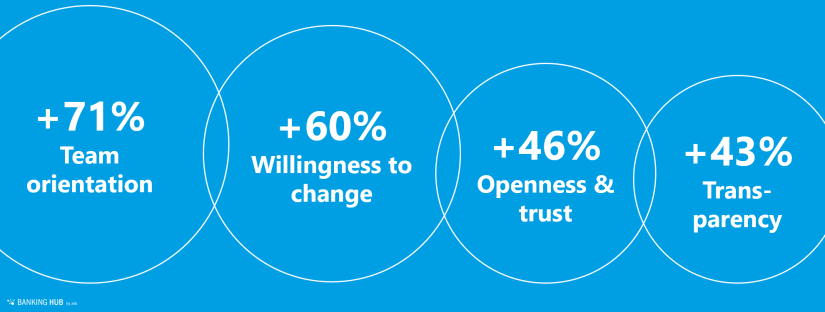Background of the study
New innovative market players, an overall more aggressive competitive environment and growing regulatory requirements have long posed significant challenges to the work organizations of financial services providers. The changed working conditions during and certainly also in the aftermath of the pandemic represent a sudden and unexpected additional challenge for corporate cultures, impacting almost all employees. As a result, there is now a considerable need to adapt corporate cultures to these challenges and in some cases to transform a “feel-good culture” into a consistent culture of success. The number and scope of projects focusing on this transformation of corporate culture are currently increasing significantly.
Transformation is the social, environmental, economic and thus also entrepreneurial challenge of our time – and cannot simply be “decreed” by management decision. Instead, it must be strategically planned, exemplified by management and implemented “with expert craftsmanship”.
Transformation study overview: indicators
As part of the study, we determined three indicators to evaluate success. These were:
- profitability
- adaptability
- client centricity
The study investigated which cultural characteristics of financial service providers make them particularly successful in terms of these three indicators.
The culture of the companies was measured based on a total of 15 cultural characteristics (e.g. leadership skills, target system, results orientation, …).
Key study results
Following an evaluation of the results, we can make the following key statements about the transformation of companies:
- In contrast to less successful companies, successful companies exhibit high levels in a large number of cultural characteristics.
- The consistent development of a culture of success has a significant positive effect on all three success indicators.
- A culture of success can be developed through systematic management, i.e. concrete measures and courses of action.
- The focus should be on seven specific fields of action in order to lead a culture to greater success (see below).
BankingHub-Newsletter
Analyses, articles and interviews about trends & innovation in banking delivered right to your inbox every 2-3 weeks
"(Required)" indicates required fields
Key characteristics of successful companies
When looking at the most successful companies, which account for 10% of the companies surveyed, and comparing them with the less successful organizations, we can identify four outstanding characteristics of successful corporate cultures:
 Figure 1: Levels of cultural characteristics of successful companies compared to less successful ones
Figure 1: Levels of cultural characteristics of successful companies compared to less successful ones- Team orientation – teams are more important than the organizational structure, so that teams constantly reform, even across the boundaries of organizational units.
- Willingness to change – change has an inspiring effect on many opinionated managers/employees; therefore a get-up-and-go attitude prevails.
- Openness & trust – feedback in all directions is a regular and integral part of communication; it is given honestly and always promptly. Thoughts on criticism or possibilities for change are openly discussed.
- Transparency – making the knowledge and information of all accessible to all is the company’s capital and is common practice in the company.
Fields of action for creating a culture of success
The results of the study show that creating a culture of success is first and foremost a matter of expert management craftsmanship. We identified seven fields of action for transforming rather traditional corporate cultures into a culture of success.
- Culture of success is a board topic – boards of successful companies drive the topic of corporate culture forward systematically, continuously and sustainably
- Clear operational responsibility – successful companies clearly anchor responsibility for the operational development of the corporate culture in their HR department
- Operationalized target culture – operationalizing the target culture into concrete recommendations for action for managers and teams is the only way to carry out concrete cultural measures
- Alignment of HR instruments – skills management in particular along with all corresponding instruments is aligned with a culture of success
- Keeping an eye on culture development – regular, lean assessments of the corporate culture enable a rapid response to desired and undesired developments
- Consistent leadership – preferably individualized development of leadership skills and regular measurement of leadership quality are integral HR instruments
- Streamlined, team-oriented target system – focus on a small number of concrete team targets with the option of making adjustments during the year
The study revealed that the appropriate design of these seven fields of action has a consistently high impact on success, irrespective of the company’s size or specific business model.
Conclusion from the 2022 transformation study
Corporate culture impacts the motivation and consequently the performance of all employees in a company. The supposedly high effort involved in working on a corporate culture is thus clearly put into perspective – because even small improvements in corporate culture have a considerable impact on the success, the future or the transformation capability of the company. The development of corporate culture is no magical feat. It is much more the observance and implementation of very specific measures.
Against the backdrop of the major challenges facing the financial services sector, deliberately failing to develop a corporate culture is, at best, a waste of the company’s potential.
We are happy to present the results of our study on corporate culture transformation to you in person. Please feel free to contact us anytime here!








